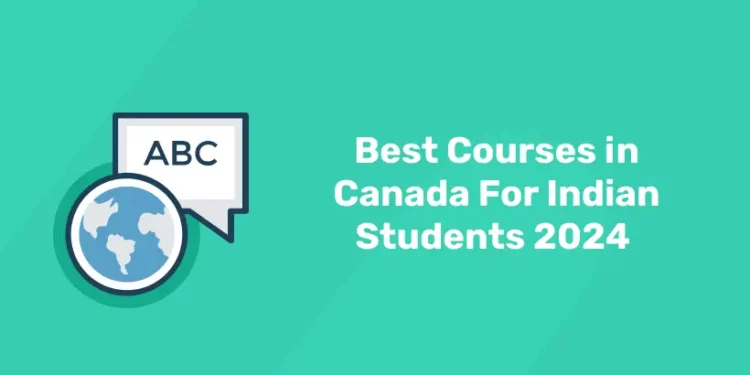Table of Contents
The most recent statistics indicates that in 2024, Canada, which is well-known for its attraction to international students attracted an astounding 550,000 new students from 184 different nations. Notably, with a significant 220,000 additional students, India emerged as the top source nation. Navigating among many courses and institutions might be difficult, but Canada is home to some of the top universities in the world. In this blog, we delve into the realm of possibilities, unveiling the best courses in Canada for Indian students in 2024.
As we step into the year 2024, the landscape of education in Canada continues to evolve, presenting an array of enticing courses that cater to diverse interests and career aspirations. Whether you are drawn to the cutting-edge world of technology, the dynamic fields of business and management, or the allure of healthcare and environmental sciences, Canada has something to offer for every passionate learner.
CRACK IELTS EXAM WITH ONLINE COACHING – JOIN NOW
Is Canada good for Education?
The country Canada is internationally recognised as a one of the best educational location, attracting students and job seekers from all over the world. Best fact is Canada is renowned for its excellent academic standards, diverse and inclusive culture, and exceptional quality of life, making it an appealing educational destination. With top-tier colleges, innovative research possibilities, and a welcoming environment, the country has become a popular destination for international students seeking a comprehensive and engaging educational experience. In this introduction, we’ll look at the fundamental elements that make Canada a top educational destination, including institutional excellence, cultural variety, job prospects, and global recognition of Canadian degrees.
High-Quality Education:
Canadian universities and colleges maintain high academic standards and rigorous quality controls. Many institutions in Canada consistently rank among the top in global university rankings.
Diverse and Inclusive Culture:
Canada is known for its multicultural society and welcoming attitude towards international students. This diversity creates a rich and vibrant cultural environment on campuses, promoting cross-cultural understanding.
Quality of Life:
Canada consistently ranks high in global quality of life indices. Cities like Vancouver, Toronto, and Montreal are known for their safety, cleanliness, and overall quality of life. This contributes to a positive and conducive environment for studying.
Work Opportunities:
Canada provides excellent opportunities for students to work part-time during their studies and full-time during scheduled breaks. After graduation, there are various options for obtaining work permits and, potentially, becoming a permanent resident.
Innovative Research and Technology:
Canadian universities are at the forefront of research and innovation. The country invests significantly in research and development, making it an attractive destination for those interested in cutting-edge advancements in various fields.
Stable and Safe Environment:
Canada is known for its political stability, low crime rates, and a strong emphasis on human rights. This makes it a safe and secure environment for students to live and study.
How Much Does it Cost to Study in Canada?
Studying in Canada can be expensive based on a number of variables, such as your lifestyle choices, region, study programme, school, and degree of education. The following generic cost estimates are provided:
Tuition Fees
The cost of tuition fee varies significantly between schools and programmes. Undergraduate programmes typically cost between CAD 7,000 and CAD 29,000 annually, while graduate programmes typically cost between CAD 7,000 and CAD 45,000. Tuition for professional programmes, such as engineering or medical, may be more.
Living Expenses
The price of housing, food, transportation, and personal expenses are only a few of the variables that affect the cost of living in Canada. You should budget between CAD 10,000 and CAD 15,000 annually for living expenditures. However, depending on the city or area you live in, this can change considerably.
CRACK IELTS EXAM WITH ONLINE COACHING – JOIN NOW
Top Courses to Study in Canada
Here we are providing you the latest updates on 2024, as the opportunities of different courses provides some information of the top courses that have historically been popular among international students in Canada. Please note that the popularity of courses may vary, and it’s advisable to check the latest trends and opportunities.
Best Undergraduate Courses in Canada for Indian Students
In Canada, a vast array of popular courses are available for college enrollment for 12th grade graduates. Undergraduate diploma programmes can last anywhere from six months to a year, depending on the university and programme. Similarly, undergraduate degree programmes often last three to four years.
1. Information Technology
One of the computer science fields with the greatest popularity and fastest growth is information technology. In the society we live in today, computer programmes and software are essential to make our lives easier.
Undergraduate courses leading to a bachelor’s degree in information technology teach students more about using computer applications to design, develop, implement, and support information systems. There is a high demand for information technology graduates because information technology is now essential to the operation of every organisation.
Canada offers excellent chances for IT professionals. In Canada, there are currently over 500,000 IT workers employed in various information technology-related industries. It’s one of the well-paying and fastest-growing jobs in Canada.
- Information systems analysts and consultants
- Project manager
- Web designers and developers
- Software Developer
- Software engineers
- Software designers
- Computer programmers
- Database analysts
Universities
- University of British Columbia
- University of Montreal
- University of Toronto
- University of Alberta
- McGill University
- Simon Fraser University
- McMaster University
- Concordia University
- University of Ottawa
Admission Process
Some selective colleges would need an application with a Graduate Management Admission Test (GMAT) score of typically more than 550. Additionally, foreign applicants will need to provide proof of their English language skills through the IELTS certification procedure.
Fees
In Canada, a bachelor’s degree in information technology can be obtained for between CAD 18,000 and CAD 40,000 as tuition fees.
2. Engineering
Engineering is one of the subjects that is essential and cannot be avoided while discussing the future of humanity. The future has long looked bright for fields like architecture, civil engineering, data sciences engineering, artificial intelligence, green energy, and even mechanical. Engineering is primarily about solving problems and using math and science concepts to meet our daily requirements, which is why it has become one of the most popular majors for students all around the world. In the US, an engineer may expect to start at around $60k and make up to $180,000 over the course of their career.
Universities
- University of Toronto
- McGill University
- University of Waterloo
- University of Alberta
- University of Ottawa
- McMaster University
- Queen’s University
- Western University
- University of Calgary
- University of British Columbia
Admission Process
- There are a few prerequisites that you must meet in order to be admitted as an international student enrolling to engineering programmes in Canada.
- Applications are required for a four-year bachelor’s degree in engineering from international students.
- A few universities will use the GRE as a factor for admission.
- A few universities need results from tests of English language proficiency. A student may be required to take the PT, TOEFL, or IELTS.
Fees
Comparing studying this field in Canada to many other countries, the cost will be lower. The amount that students must pay each year for tuition will range from C$20,000 to C$30,000, depending on the school and programme they are enrolled in.
3. Biosciences, Medicine and Healthcare
The need for workers in the healthcare sector will never go down. As innovations and groundbreaking research in the field of health care continue, there is a significant demand for this particular interdisciplinary subject. This is a more research-focused sector that is in high demand worldwide.
The healthcare sector, together with bioscience and medicine, is one of Canada’s most important and well-known industries, and it is expanding in both demand and breadth.
- Dental Medicine
- Maxillofacial Surgery
- Veterinary Medicine
- Medical Genetics
- Translational Medicine
- Parasitology
- Population Medicine
- Family Medicine
- Human Kinetics
- Neurology
- Pathology and Laboratory
- Medicine
- Paediatrics
- Optometry
- Psychiatry
- Cardiologist
- Urologist
Universities
- University of Toronto
- McGill University
- University of British Columbia
- University of Montreal
- McMaster University
Admission Process
- In order to apply to Canadian medical universities, international students must possess their certifications of passing the tenth and twelfth grades. Science background and expertise in areas like Chemistry, Physics, Mathematics, and Biology are required of the students.
- International students enrolled in Canadian universities will take tests to gauge their proficiency in the a fore mentioned topics.
- English language proficiency is also necessary for admission, as measured by an IELTS score of 7 or above, or a TOEFL score between 85 and 100.
Fee
Depending on the university and the course, studying medicine at the undergraduate level in Canada might cost anywhere from 20,000 to 65,000 CAD each year. A master’s degree in health administration will cost about 35,000 CAD, while a master’s degree in life sciences and health informatics will cost between 14,000 and 45,000 CAD annually.
4. MBA
Due to the vast global application of this particular education, MBA is a popular choice among students nowadays from all over the world. Since foreign MBA programmes offer high-paying jobs and exposure to other countries, the majority of MBA students would like to study at universities abroad. Due to their abundance of prospects, the majority of MBA-related occupations, such as management consulting, banking, and investment finance, are consistently listed as having a skills shortage globally.
- Banking & Finance
- Investment Banking
- Project Management
- Network Management
- Information System Management
- Management Consulting
- IT Security and Infrastructure
- HR Manager – Compliance
- Entrepreneurship
- Private Equity
- Technology Consulting
- Brand & Product Management
- HR Manager – Talent Acquisition
- Data Analytics
Universities
- Smith Queen’s University
- University of Alberta
- Ivey Business School
- Schulich School (York University)
- HEC Montréal
- John Molson School Of Business
- University of Canada West
- Rotman School Of Management (University of Toronto)
- Sauder School Of Business (University of British Columbia)
- Desautels McGill University
Admission Process
- When considering a Master of Business Administration programme in Canada, it’s important to consider the particular qualifying standards that apply to Canadian universities.
- The student ought to hold a bachelor’s degree from an accredited university in the relevant field of study.
- For MBA admission, nearly all of Canada’s top business schools require a GMAT score. You will need to obtain a high GMAT score in order to be admitted to a reputable university.
- In order to pursue an MBA at a Canadian university, Indian students must additionally meet the requirements for the IELTS, TOEFL, and PTE.
Fees
An MBA programme in Canada can cost anything from 30,000 to 125,000 CAD per year, depending on the university and the degree. It costs 1,1000 CAD to study an MBA at an institution like the Ivey Business School, yet it only costs 34,000 CAD at other universities like the John Molson School of Business.
5. Media and Journalism
The need for qualified experts in the fields of media studies and journalism has been exacerbated by social networking, online marketing, online media, and digital media. This course demands a great deal of creativity to work with and includes subdisciplines that concentrate on how the public obtains information.
The modern, in-demand professional paths that are challenging traditional media degrees include digital marketing, interactive design, and digital design. These fields are all products of media and journalism studies.
Universities
- University of Toronto
- University of Montreal
- University of Ottawa
- Laval University
- Concordia University
- McGill University
- University of British Columbia
- Concordia University
- Simon Fraser University
- University of Alberta
- York University
Admission Process
- When applying to Canadian universities, international students need to provide proof of passing both their tenth and twelfth grades.
- The prerequisite for a postgraduate course is a bachelor’s degree in journalism from an approved university.
- If you’re applying for a postgraduate course, it would be advantageous if you had relevant journalism work experience.
- A band score of 7.0 on the IELTS or an overall score of 80 on the TOEFL are required of the student.
- For enrollment in the course, most universities require an SLR camera that is in working order.
Fees
In Canadian universities, media and journalism courses can cost anything from CAD 5,000 to CAD 30,000 a year.
6. Human Resources
Within an enterprise, human resource management is the sole course that primarily addresses employee welfare, growth, and administration. This course’s primary goal is to keep employees interested in the organisation, which will boost productivity inside the company. The HR team’s responsibility is to identify and recruit the brightest talent in order to propel the business forward and improve both the individual and the organisation.
Universities
- University of Toronto
- University of Calgary
- Queen’s University
- University of Manitoba
- University of Windsor
- Memorial University of Newfoundland
- Trent University
- York University
Admission
- In order to apply to Canadian institutions, students who intend to pursue an undergraduate degree must possess passing certificates from grades 10 and 12.
- A three-year bachelor’s degree in any discipline with a minimum of 70% percentage is required if the student intends to enrol for a postgraduate course.
- Few universities will require applicants for postgraduate courses to have prior work experience.
Fee
The cost of pursuing an undergraduate degree in human resources ranges from 10,000 to 67,000 CAD, while the cost of pursuing a master’s degree in the same field is from 15,000 to 82,000 CAD.
7. Actuarial Science
Actuarial science is the study of using statistical and mathematical techniques to evaluate risk in insurance firms, financial institutions, and other businesses and occupations. An actuarial scientist use mathematical analysis and forecasting to assess and forecast potential outcomes in the financial industry.This course encompasses multiple disciplines and covers topics including computer science, finance, economics, probability, statistics, and mathematics.
Universities
- University of Toronto
- University of Windsor
- University of Manitoba
- McMaster University
- University of Prince Edward Island
- Concordia University
- Simon Fraser University
- University of Waterloo
Admission
- There are a few fundamental requirements for admission that you must meet if you are an overseas student intending to study actuarial science in Canada.
- International applicants must apply for a three-year actuarial science undergraduate degree or get a degree in statistics, mathematics, or any similar discipline before submitting an application for a post-graduate programme.
- A few universities have requirements regarding results from tests of English language competency. The TOEFL, PT, or IELTS may be required of a student.
Fee
The annual cost of tuition for actuarial science courses at Canadian universities ranges from 15,500 to 48,000 CAD.
8. Diploma Courses
A diploma course is a programme that might last several months or up to two years, contingent on the university and the subjects chosen. Additionally, these courses give candidates the chance to combine two one-year courses and select a specialism in a subject area of interest.
- Accounting Administration
- Artificial Intelligence
- Information Technology
- Pharmacy Technician
- Business Administration
- Business Management
- Hospitality Management
- Data Analytics and Business Intelligence
- Data Science and Big Data
Universities
- Centennial College
- Algonquin College
- North Island College
- Humber College
- Durham College
- Luther College
- Seneca College
- George Brown College
- University of Waterloo
Admission
- The primary requirement for the programme is that the study receive at least 50% of the possible points in the 12th grade.
- A PG diploma requires a three- or four-year bachelor’s degree with a score of at least 65%.
- Another crucial factor is the results of the English language proficiency test; the TOEFL should be 88 and the IELTS should be 6.5 or higher.
Fee
One-year graduate diploma programme will run two to three semesters for roughly $10,000 to $15,000 in Canadian dollars.
The duration of a two-year graduate diploma programme is four to six semesters, with an approximate cost of 13,000 to 17,000 CAD.
CRACK IELTS EXAM WITH ONLINE COACHING – JOIN NOW
How to Apply for 2024 Intake in Canada
Applying for the 2024 intake in Canada necessitates meticulous preparation and attention to detail. Prospective students who follow these crucial steps can improve their chances of a successful application and a smooth transition to studying in Canada. The most correct and up-to-date information may always be found in the official university rules. Keep in mind that specific application procedures may vary depending on the university and the program you’re interested in, so it’s crucial to check the official website of the institution for the most accurate and up-to-date information. Here’s a general guide:
Research Programs and Universities:
Explore universities and programs in Canada to find the one that best suits your academic and career goals.
Check Admission Requirements:
Review the admission requirements for the specific program you’re interested in. This may include academic qualifications, language proficiency tests (like IELTS or TOEFL), letters of recommendation, and a statement of purpose.
Prepare Required Documents:
Gather all necessary documents, including academic transcripts, letters of recommendation, a resume or curriculum vitae (CV), a statement of purpose, and proof of language proficiency.
Language Proficiency Tests:
If you’re a non-native English speaker, you’ll likely need to take an English proficiency test such as IELTS or TOEFL. Make sure to achieve the required score for your chosen program.
Create an Online Application Account:
Visit the official website of the university you’re interested in and create an online application account.
Complete the Application Form:
Fill out the online application form with accurate and complete information. Be prepared to provide details about your educational background, work experience, and personal information.
Submit Required Documents:
Upload all required documents to the online application portal. Ensure that you follow the specific guidelines provided by the university.
Pay Application Fees:
Pay the application fees, which may vary depending on the university and program. Some universities may waive fees for certain applicants, so check the details.
Track Application Status:
After submitting your application, monitor the application status through the university’s application portal. Some universities provide updates on the status of your application online.
Wait for Admission Decision:
Universities typically take some time to review applications. Once your application is reviewed, you will receive an admission decision.
Apply for a Study Permit:
If you receive an acceptance letter, you can then apply for a study permit through the Immigration, Refugees and Citizenship Canada (IRCC) website.
Prepare for Arrival:
If your study permit is approved, start preparing for your arrival in Canada. This includes arranging accommodation, travel plans, and ensuring you have the necessary health insurance.
Remember, it’s crucial to check the specific requirements and deadlines of the university and program you’re applying to, as they may vary. Always refer to the official website or contact the admissions office for the most accurate information.
Eligibility Criteria to Study in Canada
Eligibility criteria for studying in Canada can vary depending on the level of education (e.g., undergraduate, graduate), the institution, and the specific program. However, there are some general requirements that international students typically need to meet. Keep in mind that these requirements may change, so it’s always a good idea to check with the specific Canadian educational institution and the Canadian immigration authorities for the most up-to-date information.
Acceptance from a Designated Learning Institution (DLI):
To study in Canada, you must first be accepted into a program offered by a Designated Learning Institution (DLI). DLIs are institutions approved by the provincial or territorial government to host international students.
Valid Passport:
You must have a valid passport for the duration of your stay in Canada. International students require a valid student visa and passport in order to enrol in any course at any Canadian university. Always remember to apply for your Canadian student visa at least three months before to the date you want to go.
Proof of Financial Support:
You need to demonstrate that you can financially support yourself during your studies. This includes tuition fees, living expenses, and other costs. This is typically proven through bank statements, sponsor letters, or other financial documents.
Language Proficiency:
English and/or French language proficiency is required, depending on the language of instruction of your chosen program. Common language proficiency tests include the IELTS, TOEFL, or the Canadian English Language Proficiency Index Program (CELPIP).
TOEFL- (Test of English as a Foreign Language) assesses non-native English speakers’ ability to use and understand North American English. Educational Testing Service (ETS) created and administers the TOEFL examination, which includes setting the questions, administering the test, and sending the score report to each examinee. The TOEFL exam is necessary for admission to schools and institutions where English is the medium of instruction.
IELTS – The International English Language Testing System (IELTS) is an English language proficiency exam that assesses students’ language skills before they study or work in a country where English is the primary language of communication. The exam primarily assesses students’ ability to communicate using the four basic language abilities of hearing, reading, speaking, and writing.
PTE – Pearson Test of English, often known as PTE Academic, is a computer-based test that evaluates non-native speakers, listening, reading, speaking, and writing skills. PTE is Canada’s top provider of English Language Proficiency tests.
CAEL – The Canadian Academic English Language Assessment (CAEL) is a standardised test in English developed to check the level of English language for students studying in English-medium colleges and universities.
Study Permit:
Most international students require a study permit to study in Canada. You can apply for a study permit once you have received an acceptance letter from a DLI. It’s important to apply for a study permit well in advance of your intended start date.
About IELTS Exam
The International English Language Testing System (IELTS) is a renowned and pivotal examination for individuals seeking to assess their proficiency in the English language. Whether you are aspiring to study abroad, advance your career, or immigrate to an English-speaking country, the IELTS exam serves as a reliable benchmark for your language skills.
This standardized test is meticulously designed to evaluate your listening, reading, writing, and speaking abilities, making it a comprehensive assessment of your English language competence. One of the notable features of the IELTS exam is its global recognition. Accepted by thousands of institutions and organizations worldwide, it is a language proficiency exam that opens doors to various opportunities across the globe.
Universities, colleges, employers, and immigration authorities in English-speaking countries often rely on IELTS scores to determine an individual’s English language aptitude.
Entri App: Best Online course for IELTS
The IELTS course at Entri App stands out due to its comprehensive study package designed to help you achieve a high band score. With over 100 study materials, sample notes, one-on-one and group live interactive sessions with our expert mentor, recorded sessions, weekly assessments, and remote learning capabilities, our course provides a unique and affordable learning experience for IELTS aspirants.
Courses Offered
If you have aspirations of studying abroad, join our academic IELTS course. Alternatively, if you are seeking permanent residency or employment, our general IELTS course is the perfect fit.
- General IELTS
- Academic IELTS
Course Overview
- 30 Days Mentorship
- Exam Packs – Reading Practice
- PDF Course materials
- 6 Months Recorded Videos Validity
- Live Exams and Special Exams
- Recorded Video Classes on App
- IELTS with Mentorship: Get Mentorship & Recorded Videos
CRACK IELTS EXAM WITH ONLINE COACHING – JOIN NOW
FAQs
Q. Which course is best for Indian students in Canada?
Ans: These are some of the top courses in Canada,
- Computer Science and Information Technology.
- Healthcare and Life Sciences.
- Business and Finance.
- Data Analytics and Big Data.
- Cybersecurity.
- Artificial Intelligence (AI) and Machine Learning.
Q. Which course is best for future in Canada?
Ans: Top Demand Courses in Canada,
- Engineering.
- Business, Accounting and Finance.
- Computer Science & Information Technology.
- Healthcare.
- Education.
Q. What is the best education system in Canada?
Ans: Alberta Education, often known as Alberta’s Ministry of Education, is the governing body for the province’s schools. Alberta’s pupils are regarded as the best in Canada, and the province’s educational system is frequently listed as one of the world’s best.
Q. Which education is best for future in Canada?
Ans: Here is a summary of a few trending diploma courses in Canada that emphasise on employability and are in high demand:
- Accounting Administration.
- Artificial Intelligence.
- Information Technology.
- Pharmacy Technician.
- Business Administration.
- Business Management.
- Hospitality Management.
- Data Analytics and Business Intelligence.
| Related Links | |
| All About IELTS Exam | IELTS Reading Practice Test |
| IELTS Listening Practice Test | IELTS Writing Practice Test |
| IELTS Speaking Practice Test | Vocabulary in IELTS |










